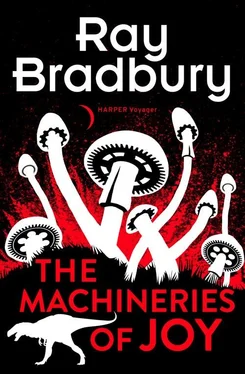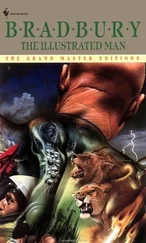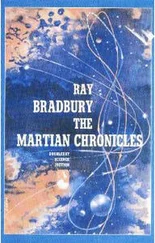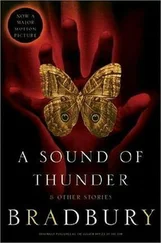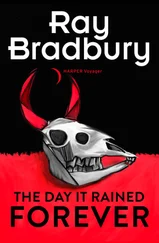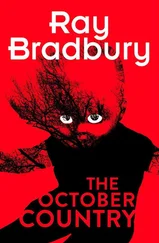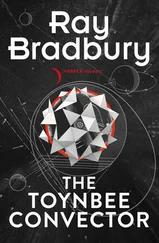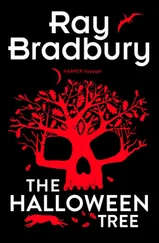He took a sledge hammer from the small rail car, and while he worked alone for half an hour fixing the rusted rails into place the woman and the boy ran along the shore. They came back with dripping shells, a dozen or more, and some beautiful pink pebbles, and sat and the boy took school from the mother, doing homework on a pad with a pencil for a time, and then at high noon the man came down, his coat off, his tie thrown aside, and they drank orange pop, watching the bubbles surge up, glutting, inside the bottles. It was quiet. They listened to the sun tune the old iron rails. The smell of hot tar on the ties moved about them in the salt wind, as the husband tapped his atlas map lightly and gently.
“We’ll go to Sacramento next month, May, then work up toward Seattle. Should make that by July first, July’s a good month in Washington, then back down as the weather cools, to Yellowstone, a few miles a day, hunt here, fish there …”
The boy, bored, moved away to throw sticks into the sea and wade out like a dog to retrieve them.
The man went on: “Winter in Tucson, then, part of the winter, moving toward Florida, up the coast in the spring, and maybe New York by June. Two years from now, Chicago in the summer. Winter, three years from now, what about Mexico City? Anywhere the rails lead us, anywhere at all, and if we come to an old offshoot rail line we don’t know anything about, what the hell, we’ll just take it, go down it, to see where it goes. And some year, by God, we’ll boat down the Mississippi, always wanted to do that. Enough to last us a lifetime. And that’s just how long I want to take to do it all …”
His voice faded. He started to fumble the map shut, but, before he could move, a bright thing fell through the air and hit the paper. It rolled off into the sand and made a wet lump.
His wife glanced at the wet place in the sand and then swiftly searched his face. His solemn eyes were too bright. And down one cheek was a track of wetness.
She gasped. She took his hand and held it, tight.
He clenched her hand very hard, his eyes shut now, and slowly he said, with difficulty, “Wouldn’t it be nice if we went to sleep tonight and in the night, somehow, it all came back. All the foolishness, all the noise, all the hate, all the terrible things, all the nightmares, all the wicked people and stupid children, all the mess, all the smallness, all the confusion, all the hope, all the need, all the love. Wouldn’t it be nice.”
She waited and nodded her head once.
Then both of them started.
For standing between them, they knew not for how long, was their son, an empty pop bottle in one hand.
The boy’s face was pale. With his free hand he reached out to touch his father’s cheek, where the single tear had made its track.
“You,” he said. “Oh, Dad, you. You haven’t anyone to play with, either. ”
The wife started to speak.
The husband moved to take the boy’s hand.
The boy jerked back. “Silly! Oh, silly! Silly fools! Oh, you dumb, dumb!” And, whirling, he rushed down to the ocean and stood there crying loudly.
The wife rose to follow, but the husband stopped her.
“No. Let him.”
And then they both grew cold and quiet. For the boy, below on the shore, crying steadily, now was writing on a piece of paper and stuffing it in the pop bottle and ramming the tin cap back on and taking the bottle and giving it a great glittering heave up in the air and out into the tidal sea.
What, thought the wife, what did he write on the note? What’s in the bottle?
The bottle moved out in the waves.
The boy stopped crying.
After a long while he walked up the shore, to stand looking at his parents. His face was neither bright nor dark, alive nor dead, ready nor resigned; it seemed a curious mixture that simply made do with time, weather and these people. They looked at him and beyond to the bay, where the bottle containing the scribbled note was almost out of sight now, shining in the waves.
Did he write what we wanted? thought the woman, did he write what he heard us just wish, just say?
Or did he write something for only himself, she wondered, that tomorrow he might wake and find himself alone in an empty world, no one around, no man, no woman, no father, no mother, no fool grownups with fool wishes, so he could trudge up to the railroad tracks and take the handcar motoring, a solitary boy, across the continental wilderness, on eternal voyages and picnics?
Is that what he wrote in the note?
Which?
She searched his colorless eyes, could not read the answer; dared not ask.
Gull shadows sailed over and kited their faces with sudden passing coolness.
“Time to go,” someone said.
They loaded the wicker basket onto the rail car. The woman tied her large bonnet securely in place with its yellow ribbon, they set the boy’s pail of shells on the floorboards, then the husband put on his tie, his vest, his coat, his hat, and they all sat on the benches of the car looking out at the sea where the bottled note was far out, blinking, on the horizon.
“Is asking enough?” said the boy. “Does wishing work?”
“Sometimes … too well.”
“It depends on what you ask for.”
The boy nodded, his eyes far away.
They looked back at where they had come from, and then ahead to where they were going.
“Goodbye, place,” said the boy, and waved.
The car rolled down the rusty rails. The sound of it dwindled, faded. The man, the woman, the boy dwindled with it in distance, among the hills.
After they were gone, the rail trembled faintly for two minutes, and ceased. A flake of rust fell. A flower nodded.
The sea was very loud.
The Drummer Boy of Shiloh
In the April night, more than once, blossoms fell from the orchard trees and lit with rustling taps on the drumskin. At midnight a peach stone left miraculously on a branch through winter, flicked by a bird, fell swift and unseen, struck once, like panic, which jerked the boy upright. In silence he listened to his own heart ruffle away, away, at last gone from his ears and back in his chest again.
After that, he turned the drum on its side, where its great lunar face peered at him whenever he opened his eyes.
His face, alert or at rest, was solemn. It was indeed a solemn time and a solemn night for a boy just turned fourteen in the peach field near the Owl Creek not far from the church at Shiloh.
“… thirty-one, thirty-two, thirty-three …”
Unable to see, he stopped counting.
Beyond the thirty-three familiar shadows, forty thousand men, exhausted by nervous expectation, unable to sleep for romantic dreams of battles yet unfought, lay crazily askew in their uniforms. A mile yet farther on, another army was strewn helter-skelter, turning slow, basting themselves with the thought of what they would do when the time came: a leap, a yell, a blind plunge their strategy, raw youth their protection and benediction.
Now and again the boy heard a vast wind come up, that gently stirred the air. But he knew what it was, the army here, the army there, whispering to itself in the dark. Some men talking to others, others murmuring to themselves, and all so quiet it was like a natural element arisen from south or north with the motion of the earth toward dawn.
What the men whispered the boy could only guess, and he guessed that it was: Me, I’m the one, I’m the one of all the rest won’t die. I’ll live through it. I’ll go home. The band will play. And I’ll be there to hear it.
Yes, thought the boy, that’s all very well for them, they can give as good as they get!
For with the careless bones of the young men harvested by night and bindled around campfires were the similarly strewn steel bones of their rifles, with bayonets fixed like eternal lightning lost in the orchard grass.
Читать дальше
